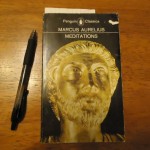Lessons on happiness can be taught by the very young and the very old alike. We can learn valuable lessons from preachers and psychologists, poets and playwrights, the poor and the rich and from people of all walks of life and from all nationalities and vocations. It can be taught by nature itself, if we will see and listen. It can also be taught by philosopher-kings who lived over 1,800 years ago.
 Emperor Marcus Aurelius reigned over the Roman Empire less than 200 years after Jesus walked the earth. And yet his writings still have relevance today to our collective struggle to find meaning, purpose and happiness. The following quotes come from his pen.
Emperor Marcus Aurelius reigned over the Roman Empire less than 200 years after Jesus walked the earth. And yet his writings still have relevance today to our collective struggle to find meaning, purpose and happiness. The following quotes come from his pen.
“It is not death that a man should fear, but he should fear never beginning to live.”
It seems Martin Luther King Jr. had a similar idea in mind when he claimed that a man who is not ready to die for a cause, is not fit to live. That was an understandable overstatement, given the segregated context of King’s life. But I would amend the statement to say this instead:
A person with no compelling cause for which he would die, has not yet truly begun to live.
In other words, there is an incomparable quality and depth of meaning attached to a life devoted to a cause worth dying for. It makes life a visceral activity, packed with passion and importance. It beats in the hearts of people like King and Gandhi and Jesus and others who sacrificed their lives in a universal struggle for human improvement. It is the ultimate expression of love for others, or for truth, or for God. It is a life brimming with importance and significance … and a depth of joy not understood by those who live primarily for themselves.
Disclaimer: There is a world of difference between losing your life in the process of dedicating yourself to a noble cause – death being the potential side-effect of standing for something – from one who ignobly straps explosives to his body to blowup children in the name of a horribly misguided cause.
Besides, it’s not so much the dying for a cause that adds happiness to life. The dying part, as a matter of fact, ends mortal happiness altogether! Rather, it’s the willingness to die for something considered more valuable than mortal life itself. Valuing something higher than living adds value to both the thing valued and, almost paradoxically, to the life being lived. It’s the ultimate act and attitude of selflessness.
Therein lies the sense of peace and purpose and joy.
The statement that says, “These ideas are so important, they matter so much, that even my life is secondary to them,” does not denigrate or cheapen life; it elevates it. And an elevated life is a happier one.
“To live each day as though one’s last, never flustered, never apathetic, never attitudinizing – here is perfection of character.”
How would you treat your mom, brother, daughter, neighbor, waiter, class nerd, if you knew you would die next weekend? Who would you spend time with? What would you say to others? How would you say it? Who would you forgive? Who would you ask forgiveness from? How would you live those handful of final hours on earth? What wouldn’t you do today or tonight or tomorrow? Would you stress over small matters? Would you scream and shout over minor concerns? Would you make mountains out of molehills?
Then why waste time on them today?
Happiness is the byproduct of living and thinking well. Happiness expands as we use our days to improve how we live and the quality of our thoughts. It contracts to the degree our days are spent thinking and living poorly.
“The sole life which a man can lose is that which he is living at the moment.”
That, then, is the secret: Just as meals can only be enjoyed one bite at a time, so life is experienced by the moment. Days are not lost or wasted as days, but by allowing them to be drained of meaning and significance one moment at a time.
Try this: For every task, every activity, every thing you do, simply ask yourself how you can improve that thing, that task, that moment. Ask yourself how you can make the thing you’re doing more meaningful or more joyful.
Once answered, act on the answers and begin enjoying the moments that make the days that make the years that make a lifetime of happiness.
Afterthoughts
Living life to its fullest, wringing the most happiness from the moments that fill each day, will likely require a lot from you at first.Newton’s law of motion applies equally to people: a body at rest tends to stay at rest and a body in motion tends to stay in motion. If you have years of inertia behind you, it will likely take a strong initial shove and a determined commitment to permanently change course.
But once you establish the habit of filling life’s moments with purpose and meaning, importance and joy, life will seem to expand and grow, almost organically. And then you will enjoy each breath, each moment of each day, adding meaning to life more abundantly.
Life will then be happier as it’s lived without regret or guilt or shame, as though each moment represented the moment before you were scheduled to meet your Maker, not in fear and trembling, but in peace and humble confidence that you’re living life well.
Life will be happier as you take advantage of each day in an attitude of joyful, positive, gratitude, always looking to improve the moment.
So make the philosopher-king proud and go and improve the moment!
Follow this link to a previous post called: What Can a Dead Roman Teach us about Happiness?
What do you think? What cause animates you? How has living in the moment made each moment better? Please comment! I would love to hear from you!







































No Comment